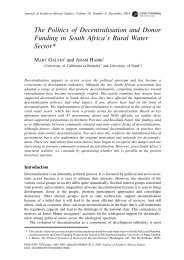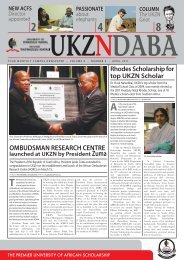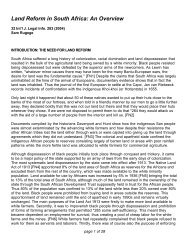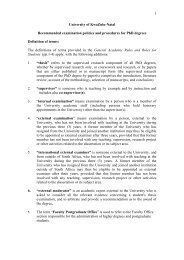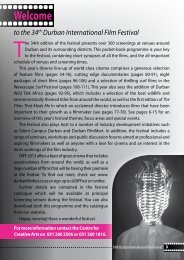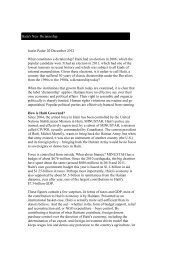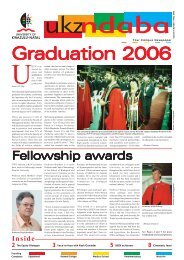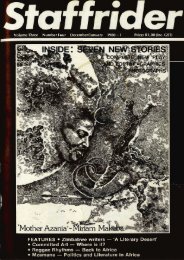Staffrider Vol.6 No.2 1985 - DISA
Staffrider Vol.6 No.2 1985 - DISA
Staffrider Vol.6 No.2 1985 - DISA
Create successful ePaper yourself
Turn your PDF publications into a flip-book with our unique Google optimized e-Paper software.
The I 1 ^Photographs by David JoosteBMby Richard Kichard NtuliiteMasterIntroduction and interviews byJon Lewis and Mark SwillingINTRODUCTIONFor over a year 130 MAWU members dismissed fromLiteMaster in Wadeville have been meeting three times perweek at Morena Store, Katlehong, waiting for the results of acourt case which will decide their fate. These regular meetingsmaintain the workers' morale and solidarity. They alsoprovide education. The tactics of the employer and questionsof trade union organisation are debated in detail. Thesemeetings are highly disciplined and structured — peoplespeak only through the chairperson. At the same time allmembers are encouraged to participate. The debates areinterspersed with song.Richard Ntuli's story was a collective effort. Although heprovided the main narrative his story was constantlycorrected and added to by other members. Richard Ntuli wasthe first chairperson of the first shop steward council set upon the East Rand in 1981.PHINEAS TOLO: I started working for LiteMaster on 13 May1954 — making score (doing piece work). The score was toohigh to reach. We were under pressure every day. There wasno time to go anywhere. I worked so hard — until my fingerswere bleeding and painful. The basic wage was R6.93 perweek. Working 7.00 a.m. till 7.00 p.m. and Saturday 7.00 a.m.till 4.00 p.m. you could earn R9 to Rll.I joined MAWU on 7 March 1981. Before the union cameworkers had no power. There were no strikes. If you talked,if you were late, if you mentioned wages, if you didn't makethe score — then you were chased out. So as soon as youreached the score they increased it.DAVID KHUBEKA: I started working for LiteMaster on23 September 1963. I worked in the Automatic Departmentoperating many machines. We had to work faster all the time.storyI was changed to one machine making lampholders. I wasworking so hard that my hands were burning and bleeding.During that time management were 'boxing' the workforce.If you said anything you were chased out — no goingto the office to discuss it.When a foreman wanted to move you, you were takenroughly — not asked nicely.A white mechanic was hitting a black worker — and theworker was chased out.The work was dirty but there were no overalls. Duringthat time you were not allowed to ask for an increase. Ifthere was an increase it was one or two cents — no more.They were chasing out workers all the time. There was nounion then. Before MAWU came there was a TUCSA union,but they started by seeing management and then came to us.This was not the right way.WORKING FOR LITEMASTERI started working for LiteMaster on 19 January 1975. Theytold me there is a score (production target) at LiteMaster. Iasked them what is a score? I told them I had come to doany job and I know all the jobs, so they employed me. MrLampke and Mr Mdamane employed me.I first worked in the Appliances Department makingtoasters, irons, fans and table-lamps. There were no overallsat the time. I worked there for eight months. I then movedto the Stamping Department. I was sent all over the factorydoing different jobs. I told them I only wanted to do onejob. I was left alone with five machines. I made parts fortoasters. There was a coloured man, Len Con, who set themachines. He was a clever guy because he kept his job.There was a time when they gave me an increase of threecents. I took the amount out of the envelope and gave itback to the foreman because I was not satisfied.After they realised I was a hard worker I was shifted toSTOP PRESSVICTORY FOR WORKERS!Nearly 2 years after thedismissal of 65 Litemasterworkers, they have nowwon their jobs back withback pay as from 10 November1984 by order of theIndustrial Court. Throughoutthis period they continuedto maintain disciplineand solidarity. ThirtyLitemaster workers were,however, not awarded theirjobs back. Ntuli promisesthat they will continue tofight to have these workersreinstated.Richard Ntuli points out the LiteMasterfactory.STAFFRIDER, VOL. 6 NO. 2, <strong>1985</strong> 13




